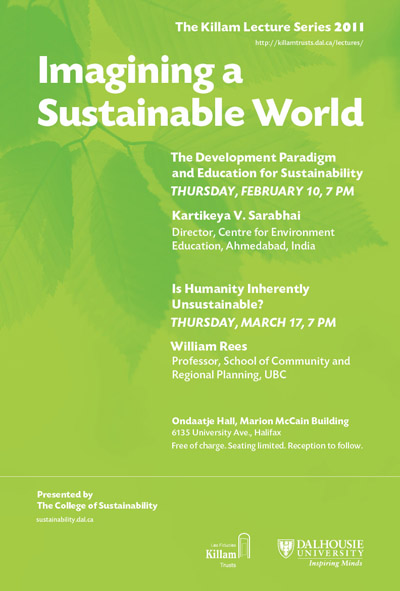 |
| The Killam Lecture Series 2011 |
Controversy about climate change and the wrangling among national delegations, NGOs and others at recent climate talks in Copenhagen and Cancun might lead people to believe sustainability is only about atmospheric carbon, and that climate change is our only environmental challenge. Yet looming issues around energy, food security and water resources could create similar controversy in the near future. Behind the ācrisis of the momentā coverage areĀ much deeper issues of generational justice, ethics and the role of human societies in dealing fairly and prudently with the future of our planet.
While evidence is mounted by some and disputed by others, governments, industry and educational institutions around the world struggle to understand what next steps should be taken.
Can we decide and come to an agreement on what a sustainable world will look like and how we as humans can shepherd it? Do humans have a role in making a sustainable planet, or are we wired to exist in conflict with our natural environment and over-consume to our own eventual demise?
This theme will be discussed in "Imagining a sustainable world: Educating for social change and sustainable behaviour," the 2011 Dorothy J. Killam Memorial Lecture Series, co-sponsored by Dalhousieās College of Sustainability. The lectures take place on Feb. 10 and March 17, 2011 and feature internationally-renowned speakers Kartikeya Sarabhai and William Rees.
"Sustainability is really a matter of generational justice, of the kind of world, the quality of life, and the opportunities for fulfillment that we will leave for those who come after us," says Steve Mannell, director of the College of Sustainability and coordinator of the 2011 Killam Lecture Series. "Educating for sustainability is something significant that we can do right now, to enable the next generation to plot a different way forward for humanity."
Kicking off this yearās series on February 10 is Kartikeya Sarabhai and his lecture entitled, "The development paradigm and education for sustainability." Mr. Sarabhai is the director of the Centre for Environment Education in Ahmedabad, India as well as the editor-in-chief of the Journal of Education for Sustainable Development. His previous work has examined where we stand now after a decade of using the Earth Charter for education for sustainable development.
William Rees, professor in the School of Community and Regional Planning at the University of British Columbia, will discuss "Is humanity inherently unsustainable?" during his lecture on February 17. Mr. Rees is the originator of the "ecological footprint" concept and works in the realm of ecological economics and human ecology. After decades of measuring our impact on the planet, he now explores the area of human cognition and human nature. How can we explain humanity's impulse towards denial of issues like climate change and dangerous threats to our own survival?
"People are often confused about the substance of sustainability, and distracted by 'green' gadgets like photovoltaic panels and hybrid cars," says Dr. Mannell. "Our Killam lecturers will lead us much deeper into the challenge, helping us to see that sustainability is a mindset, a way of being in the world."
pilipiliĀž»'s Dorothy J. Killam Memorial Lecture Series is a popular annual event, bringing together the university community, the general public and renowned scholars and thinkers from around the world.TheĀ series presents important and topical issues with an aim to stimulate public support for pre-doctoral and post-doctoral research. The lectures are also a means to encourage other wealthy Canadians to follow the example of Izaak Walton Killam and Dorothy Johnston Killam in endowing research with private resources.
Both lectures will take place in Ondaatje Hall in the McCain Building. The lectures will start at 7 p.m. and are free of charge. Please arrive early as seating is limited. A reception will follow.
For more information, visit the Killam website at http://killamtrusts.dal.ca/lectures/ or call the College of Sustainability at 494-4581
